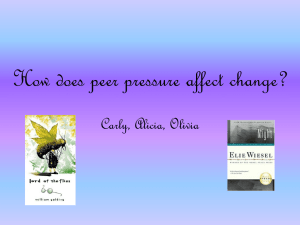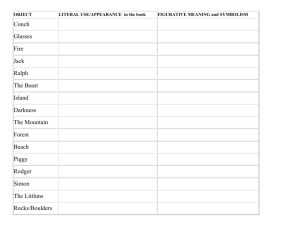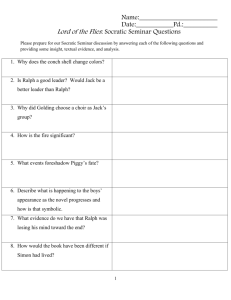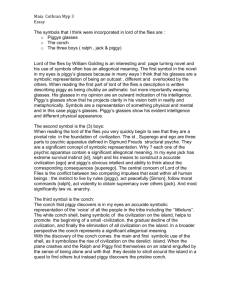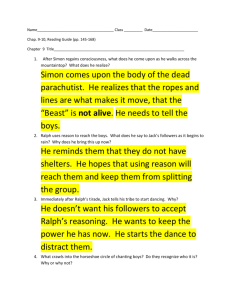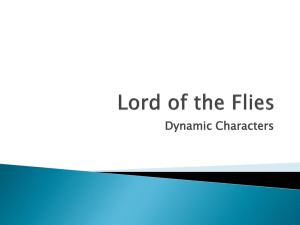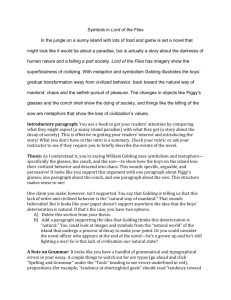1 Name Removed First Essay Example The Lord of the Flies written
advertisement
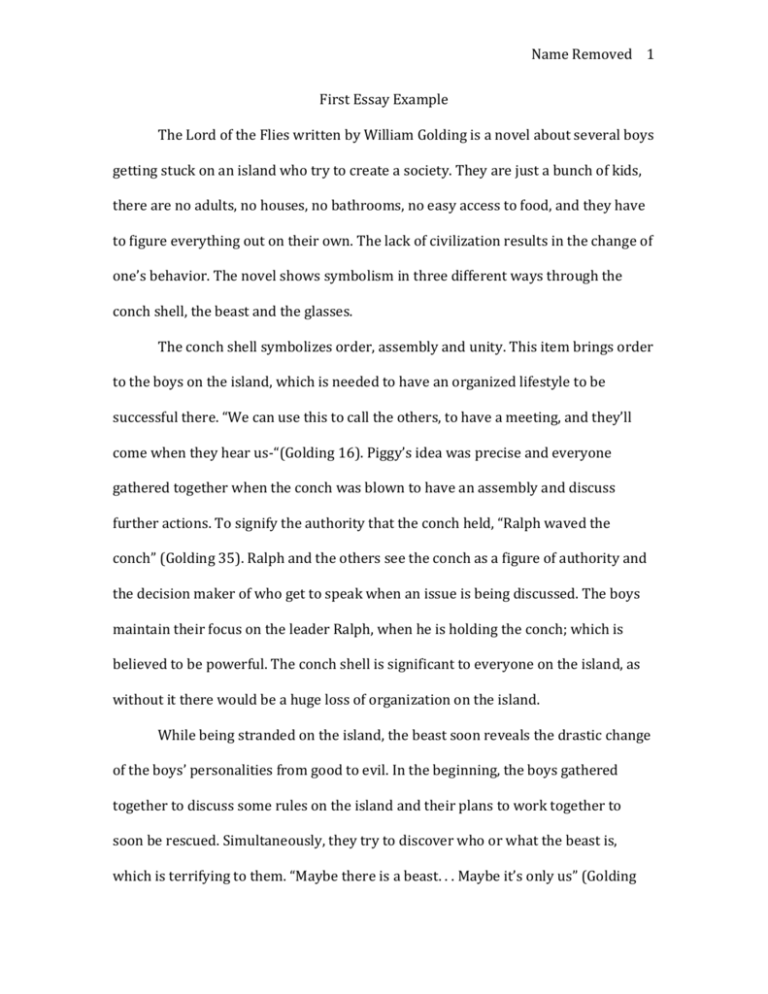
Name Removed 1 First Essay Example The Lord of the Flies written by William Golding is a novel about several boys getting stuck on an island who try to create a society. They are just a bunch of kids, there are no adults, no houses, no bathrooms, no easy access to food, and they have to figure everything out on their own. The lack of civilization results in the change of one’s behavior. The novel shows symbolism in three different ways through the conch shell, the beast and the glasses. The conch shell symbolizes order, assembly and unity. This item brings order to the boys on the island, which is needed to have an organized lifestyle to be successful there. “We can use this to call the others, to have a meeting, and they’ll come when they hear us-“(Golding 16). Piggy’s idea was precise and everyone gathered together when the conch was blown to have an assembly and discuss further actions. To signify the authority that the conch held, “Ralph waved the conch” (Golding 35). Ralph and the others see the conch as a figure of authority and the decision maker of who get to speak when an issue is being discussed. The boys maintain their focus on the leader Ralph, when he is holding the conch; which is believed to be powerful. The conch shell is significant to everyone on the island, as without it there would be a huge loss of organization on the island. While being stranded on the island, the beast soon reveals the drastic change of the boys’ personalities from good to evil. In the beginning, the boys gathered together to discuss some rules on the island and their plans to work together to soon be rescued. Simultaneously, they try to discover who or what the beast is, which is terrifying to them. “Maybe there is a beast. . . Maybe it’s only us” (Golding Name Removed 2 80). On their own, one by one, they start to realize that the real beast is within them, which causes them to begin acting in such savage-like ways. “Fancy thinking the Beast was something you could hunt and kill! You knew, didn’t you? I’m part of you?” (Golding 143). The beast is no longer an actual creature, it is they. Jack and the all of the other boys decide to leave Ralph’s group, which leaves Ralph and Piggy on their own. The result of this action causes everyone in Jacks group turn away from the laws of civilization; they start to no longer have concern for the lives of anyone else. The “beast” takes over the minds of these young, innocent boys which trigger them to be the total opposite, less humane and more monstrous. The glasses signify survival for the boys as they endure many complicated changes. Piggy’s glasses provided a fire, which was a major resource to stay alive. The fire was able to provide heat to cook food, warmth and a rescue signal for ships passing by. “His specs-use them as burning glasses!” (Golding 52). Easily, they snatch Piggy’s glasses, not caring if he can see or not, and use them to create a fire. After a while, tension starts to build up between the boys, causing stress for Piggy. “I got to have them specs. Now I only got one eye” (Golding 90). Ralph was angry with Jack since he was not aware about the fire burning out. There was a ship that passed by, since the fire was out, they did not have a chance of being rescued. Ralph fought Jack and by accident, knocked Piggy’s glasses off his face, which fell to the ground causing one of the lenses to break. Piggy has trouble seeing now, which is obviously not a concern to anyone. The only reason Piggy was able to survive for so long during the novel is because he was the owner of the glasses. His glasses are useless Name Removed 3 to everyone else out in the real world, but on the island, it is the best resource they have. Throughout the novel, the boys are constantly trying to make it on their own without the help of others, which they desperately need. At the start, they tried to work together, which didn’t last long, resulting in the death of some of the boys on the island. The detail in the book is remarkable, and the harder it is read into, it reveals many secrets and surprises. Symbolism is constantly shown during the entire story; the glasses, the beast and the fire are just three examples out of many. Name Removed 4 Second Essay Example In Literature a symbol stands for something else; without symbols a story would just seem insignificant and have no purpose. Lord of the Flies by William Golding suggests that without order and control, there would be no society. Throughout the novel, Golding uses the symbols of glasses, fire and the conch shell to represent Piggy’s and Ralph’s hope for order and a way back home, while for Jack these items are an attempt to gain authority and control. In the story, the glasses shell symbolizes knowledge and power. To start off, the glasses were worn by Piggy to see, but the boys soon discovered another use for them. These glasses represent intelligence and authority. Whenever Piggy wears these glasses he is intellectual while without them, he cannot see which makes him useless. “My specs!” howled Piggy. “Give me my specs!” (Golding 41). The glasses also mean power because they use these glasses to start a fire. Even Jack found the glasses so useful he stole the glasses from Piggy to make fires for cooking boar. After Jack stole the glasses, Piggy said, “Course it’s no use, Ralph. Now we got no fire” (Golding 169). This shows the readers that without the glasses Ralph will not be able to amplify the light to create a signal fire. In conclusion, Piggy’s glasses are significant because it means who is in charge and it makes a signal fire which is the only way to get back to their homes. On the island, the fire denotes leadership and a way off the island. As soon as the plane crashed, all Ralph could think of throughout the entire story was that they needed to create a fire for rescue, “There’s another thing. We can help them to find us. If a ship comes near the island they may not notice us. So we must make smoke on top of the mountain. We must make a fire” (Golding 38). As the story progresses, the fire was used Name Removed 5 for food instead for rescue. Once the two camps divided, the fire symbolized power because whoever had the glasses could make a fire, and would have absolute control. Jack soon found out that the only way for him to survive was to get a fire, “We’ll raid them and take fire” (Golding 136). This illustrates how Jack wants fire and desires power. The representation of the fire is different for some characters because it means rescue for Ralph but on the other hand it means food and power for Jack. This normal conch shell symbolizes civilization because in this story Ralph and Piggy use the conch to keep everything in order. The conch shell was first used to call the other survivors, “We can use this to call the others. Have a meeting. They’ll come when they hear us” (Golding 16). It shows how at first the conch is making the situation more civilized. It also stands for unity because whoever holds the conch has the right to speak freely, and to be listened to, not interrupted. Although, sometimes the group does not care about the rules, “I got the conch,” said Piggy, in a hurt voice. “I got a right to speak” (Golding 44). However, the conch shell becomes less and less important which shows that people are not working together. Piggy’s glasses, fire, and the conch shell represent order, rescue, authority, and control. These items stand for the longing to have complete control or to have a way of getting home. Lord of the Flies therefore illustrates a hopeful attempt to preserve a civilization. Name Removed 6 Third Example Essay William Golding wrote Lord of the Flies in September of 1954, which is about a group of stranded British boys dealing with humanities underlying problem. In this allegorical novel, William Golding constructs an intricate web of analogies that capture the impossible idea of perfect order in civilization, the use of science to curve history and man’s capacity for savagery. The conch shell reflects order and power. The first example of this is when Ralph blows the conch and the kids gather together “Where’s the man with the trumpet?” (Golding 13). After gathering the kids with the conch, Ralph is elected to be chief due to the fact that he has the conch which represents power of the conch “Let him be chief with the trumpet-thing.”(Golding 15). In conclusion, the conch has many different representations but ultimately shows that the conch represents order and power. Piggy’s glasses show intelligence and the power of science. For instance, in the beginning of the book, the boys use Piggy’s glasses to light a fire which saves the boy from the cold and starvation. “His specs-use them as burning glasses!” (Golding 32). With this in mind, later in the book Jack’s group raided Ralph’s group and only took Piggy’s glasses (in order to light a fire) “From his left hand dangled Piggy’s broken glasses” (Golding 151). Piggy’s glasses served many important roles in Lord of the Flies and each one reflects important social decisions. The beast is main driving force for the boy’s savagery and loss of innocence. In the beginning of the book, the boys are all scared of the beast and argue over what the beast is. “He says the beast comes out of the sea.” (Golding 76). As the Name Removed 7 story progresses the boys become belief in the beast grows which is the fault of their savageness. Soon the boys are idolizing the beast and making sacrifices to it “This head is for the beast. It’s a gift.” (Golding 122). In total the beast symbolizes the primitive instinct that the boys have. Thru the conch, Piggy’s glasses and the beast, William Golding shows the true colors of man and his strive for savagery and chaos. As the conch demonstrated the lighter side of humanity with the struggle of order and power, Piggy’s glasses helped transition the root problems of humanity. Lastly, the beast represents man’s true colors by disintegrating the small group of boys into raging savages. In these twisted turn of events, humanity’s dark side is clearly illustrated in the small group of stranded Name Removed 8 Fourth Example Essay The novel Lord of the Flies by William Golding tells the story of a group of boys who become stuck on an island and are forced to try to survive. During this time on the island some of the boys begin to turn more savage while others remain focused on being rescued. Throughout the boys’ time on the island; three items are used to symbolize certain aspects of the book. The conch shell, signal fire, and glasses are used to represent authority, order, survival, and intelligence throughout the course of the novel. The conch shell is a symbol of authority and order. In the story Ralph holds the conch a lot which shows he is the leader and therefore, has the most authority on the island. Ralph tells the boys, “I’ll give the conch to the next person to speak” (Golding 33). This represents order because whenever a person holds the shell, it is their turn to talk. This prevents disorder on the island and makes sure that everyone has a turn for their voice to be heard. In addition to everyone having a chance to speak, the shell also ensures that whoever does not have the conch will stop what they are doing and listen to whoever is speaking. “Then Piggy was standing cradling the cream shell and the shouting died down” (Golding 33). This shows how powerful the conch is because when Piggy has it everyone stops talking to listen. The conch shell is a crucial item on the island that symbolizes organization and power. The signal fire symbolizes survival. Ralph says “We’ve got to have special people for looking after the fire. Any day there may be a ship out there” (Golding 42). When Ralph says this he emphasizes the importance of the fire. Without it the boys would have no chance of being rescued. Later in the story, some of the boys Name Removed 9 begin to forget the significance of the fire. When Jack goes hunting he forgets to watch the fire and Ralph says, “You and your blood, Jack Merridew! You and your hunting! We might of gone home” (Golding 70). This shows how vital the signal fire was to their survival. Ironically, in the end a fire is what ends up saving the boys, despite the fact that they forgot how imperative the fire was. Piggy’s glasses symbolize intelligence. When Jack comes up with an idea to make a fire he says, “His specs—use them as burning glasses!” (Golding 40). Using Piggy’s glasses to make a fire was very smart and represents intelligence. In the story Piggy says, “You didn’t ought to have let the fire out. You said you’d keep the smoke going--” (Golding 71). Piggy is unable to finish his sentence because Jack breaks his glasses. By doing this Jack disabled Piggy from saying something intelligent which shows just how important the glasses are. In the book it is very clear that Piggy’s glasses are very significant because they represent intellect. The conch shell, fire, and Piggy’s glasses symbolize organization, power, survival, and intellect. Throughout the novel the emphasis on how important these items are is very clear because they all represent things that exist in the real world. This makes the novel more relatable to readers. Name Removed 10 Fifth Essay Example In William Golding’s novel Lord of the Flies, Simon, one of the main characters, comes to the realization regarding the beast, “What I mean is . . . maybe it’s only us.” (Golding 89) Simon is the only character with the insight to understand that the beast that the boys are afraid of is merely symbolic of the darkness inside of each of them and that truly the only thing the boys have to fear is themselves. While Simon recognizes the symbols and metaphors within the narrative of the story, Golding himself is busy creating many symbols and metaphors of his own. In Lord of the Flies, William Golding develops many important symbols including Simon himself, Piggy’s glasses, and finally the conch shell. The character, Simon, can be compared to Christ or is developed by Golding as a Christ figure. When he goes to his lonely spot on the island it is similar to Jesus being alone in the desert for the long period of time and being tempted by Satan or the beast. In Lord of the Flies the beast taunts and tempts Simon when he says, “There isn’t anyone to help you. And I’m the Beast … Fancy thinking the Beast was something you can hunt and kill! … You knew, didn’t you? I’m part of you? Close, close, close! I’m the reason why it’s no go? Why things are the way they are?” (Golding 143). Here Simon talks to the pig’s head (the beast) while he is alone. This is related to Jesus being tempted by the devil in the desert. Simon also performs other selfless acts just like Christ did. While other older boys like Ralph and Jack largely ignore the needs of the smaller children, it is Simon who finds for the littluns “the fruit they could not reach, pulled off the choicest from up in the foliage, passed them back down to the endless, out-stretched hands” (Golding 56). Simon is selfless and seeks only to help the smaller children who can fend Name Removed 11 for themselves. There is a definite symbolic connection developed here between Simon and the story of Jesus giving bread and fish to hungry people. In these ways a strong and well-developed connection can be seen between Golding’s Simon and Jesus of Nazareth. Piggy’s glasses symbolize the light of reason, the rational part of humanity, and survival. At first, the boys use the glasses only for starting fires to signal for help and to provide safety and warmth, but later on they use to signal ships and to try to kill Ralph. As the boys are trying to start a fire, Jack shouts, “His specs—use them as burning glasses!” (Golding 40). The boys quickly recognize the importance of the Piggy’s glasses and use them to start a fire so they can signal for help. In the early parts of the novel, the glasses symbolize civilization and reason through their ability to bring the boys together, organize them into sentries, and act as a possible beacon to outside civilization and the promise of being rescued. They hold the glass lens between the sun and the wood and the wood eventually starts to burn. The glasses are very useful later on in the book. They use it to make fires. In the end, Jack’s crew ironically turns the once rational and helpful role of the glasses on its head and tries to kill Ralph by setting a field of grass, which ralph was hiding in, on fire with Piggy’s glasses. “Once more the invisible group sniggered. He heard a trickling sound and then a louder crepitation as if someone were unwrapping great sheets of cellophane” (Golding 194). Ralph is being smoked out by the hunters and is listening to Jack setting the underbrush that he is hiding in on fire. This fire ironically saves them by signaling an officer to come to the island. The conch shell symbolizes unity and civilization among the boys. When the conch is first discovered in the opening chapter, Piggy quickly recognizes its worth and remarks, “We can use this to call the others. Have a meeting. They’ll come when they Name Removed 12 hear us” (Golding 16). The conch shell and meetings, rules, and the order the law become quickly and strongly symbolically intertwined. The boys also use the conch shell at the meetings. There was only one conch, so many problems start to rise among the boys. Later in the book, Jack’s crew raids Ralph’s campsite, but they do not take the conch. Piggy says, “They didn’t come for the conch. They came for something else” (Golding 168). This shows that the conch meant nothing at all to Jack’s crew. Jack’s group is descending into savagery and their ignoring the conch during their raid is strongly symbolic of this. All in all, the conch was very dynamic in Lord of the Flies. Symbols and metaphors are indeed important in Golding’s Lord of the Flies and are used to help him develop his ideas and themes throughout the novel. The symbols of Simon, Piggy’s glasses, and the conch are only three of the many symbols Golding creates in his writing. There are many more symbols in this book, but these three are certainly among the most important and well-developed symbols in the novel.
